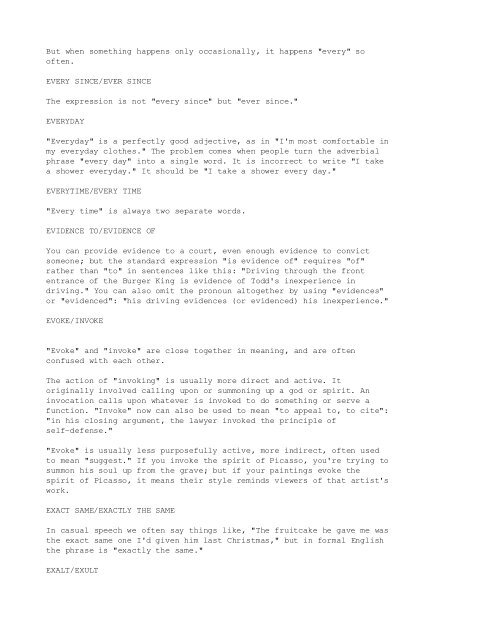Common_Errors_in_English_usage
Common_Errors_in_English_usage
Common_Errors_in_English_usage
You also want an ePaper? Increase the reach of your titles
YUMPU automatically turns print PDFs into web optimized ePapers that Google loves.
But when someth<strong>in</strong>g happens only occasionally, it happens "every" so<br />
often.<br />
EVERY SINCE/EVER SINCE<br />
The expression is not "every s<strong>in</strong>ce" but "ever s<strong>in</strong>ce."<br />
EVERYDAY<br />
"Everyday" is a perfectly good adjective, as <strong>in</strong> "I'm most comfortable <strong>in</strong><br />
my everyday clothes." The problem comes when people turn the adverbial<br />
phrase "every day" <strong>in</strong>to a s<strong>in</strong>gle word. It is <strong>in</strong>correct to write "I take<br />
a shower everyday." It should be "I take a shower every day."<br />
EVERYTIME/EVERY TIME<br />
"Every time" is always two separate words.<br />
EVIDENCE TO/EVIDENCE OF<br />
You can provide evidence to a court, even enough evidence to convict<br />
someone; but the standard expression "is evidence of" requires "of"<br />
rather than "to" <strong>in</strong> sentences like this: "Driv<strong>in</strong>g through the front<br />
entrance of the Burger K<strong>in</strong>g is evidence of Todd's <strong>in</strong>experience <strong>in</strong><br />
driv<strong>in</strong>g." You can also omit the pronoun altogether by us<strong>in</strong>g "evidences"<br />
or "evidenced": "his driv<strong>in</strong>g evidences (or evidenced) his <strong>in</strong>experience."<br />
EVOKE/INVOKE<br />
"Evoke" and "<strong>in</strong>voke" are close together <strong>in</strong> mean<strong>in</strong>g, and are often<br />
confused with each other.<br />
The action of "<strong>in</strong>vok<strong>in</strong>g" is usually more direct and active. It<br />
orig<strong>in</strong>ally <strong>in</strong>volved call<strong>in</strong>g upon or summon<strong>in</strong>g up a god or spirit. An<br />
<strong>in</strong>vocation calls upon whatever is <strong>in</strong>voked to do someth<strong>in</strong>g or serve a<br />
function. "Invoke" now can also be used to mean "to appeal to, to cite":<br />
"<strong>in</strong> his clos<strong>in</strong>g argument, the lawyer <strong>in</strong>voked the pr<strong>in</strong>ciple of<br />
selfdefense."<br />
"Evoke" is usually less purposefully active, more <strong>in</strong>direct, often used<br />
to mean "suggest." If you <strong>in</strong>voke the spirit of Picasso, you're try<strong>in</strong>g to<br />
summon his soul up from the grave; but if your pa<strong>in</strong>t<strong>in</strong>gs evoke the<br />
spirit of Picasso, it means their style rem<strong>in</strong>ds viewers of that artist's<br />
work.<br />
EXACT SAME/EXACTLY THE SAME<br />
In casual speech we often say th<strong>in</strong>gs like, "The fruitcake he gave me was<br />
the exact same one I'd given him last Christmas," but <strong>in</strong> formal <strong>English</strong><br />
the phrase is "exactly the same."<br />
EXALT/EXULT





